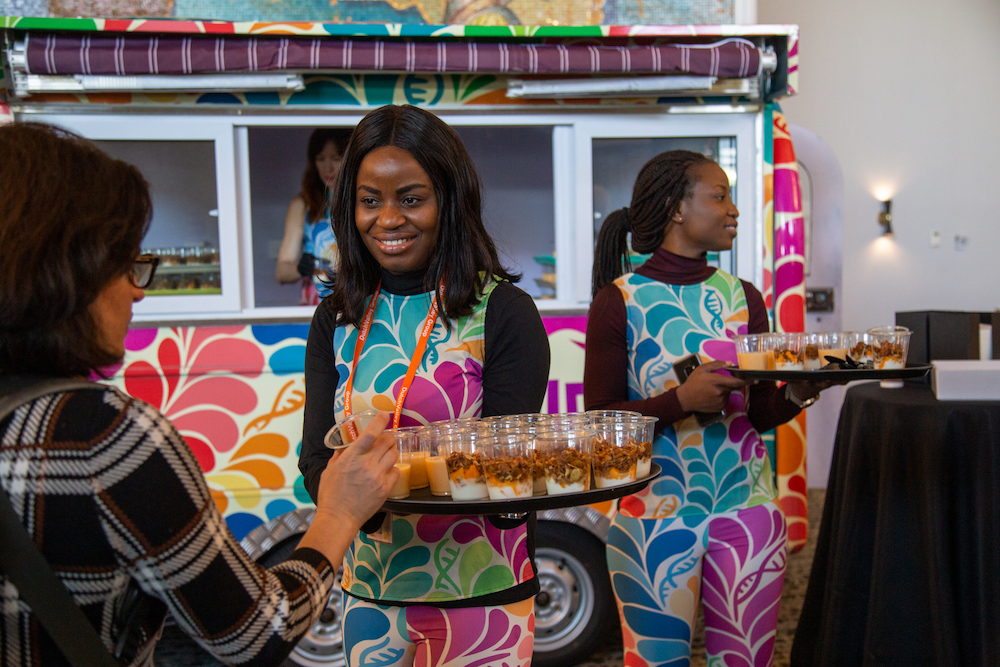Cornell’s newest science communications vehicle is retro, mobile and dishing modified munchies with a side of biotechnology knowledge.
“Modified,” the Cornell Alliance for Science food cart, rolled into the foyer of the Plant and Animal Genome conference in San Diego on Jan. 13 to serve 3,000 genetically modified Rainbow papaya, fresh from Hawaii. Decorated with vibrant colors and a retro vibe, the food truck is an eye-catching way for scientists to engage with the public about genetic modification and food security.
Sarah Evanega, director of the Alliance for Science, unveiled the food truck during her plenary talk as she addressed thousands of scientists about the critical need for science communication.
“I work in science to make a difference,” Evanega said in her keynote address. She encouraged scientists to engage directly in conversations about science and advocate for the role their research can play in solving some of the planet’s biggest challenges.
“We each need to take our own daily actions — be they large or small — to advocate for science and communicate about the changes we know are possible in the world,” she said.
As Gaurav Thapa sampled a papaya parfait, he lamented the troubles he and fellow scientists face in communicating with the general public.
“Most people don’t know what we do,” said the researcher, who studies plant disease resistance in rice at the University of Arkansas. “There’s disparity between what we are trying to achieve and what the public is hearing.”
He said Evanega’s talk inspired him to engage more with the public about questions of science that are important to him and his work.
The Modified food truck was created to spur dialogue. Staffed by scientists such as Modesta Abugu, a tomato geneticist at the University of Florida and 2015 Cornell Alliance for Science Global Leadership Fellow, and Nyasha Mudukuti, a plant biotechnologist and 2019 Fellow, the “Mod Squad” team handed out smoothies, salsa and parfaits made from papaya while engaging with fellow scientists about biotechnology’s role in global food security.
“As scientists, we must take our work to the people,” said Mudukuti, a science communications and networking associate with the Alliance. “It is now more critical than ever that we communicate effectively and bridge the gap between science and the public.”

The menu was chosen for a reason. The papaya industry came under intense pressure from a deadly virus sweeping across Hawaii in the 1990s. By 1998, production in the islands’ main growing regions had fallen by 50 percent compared to just six years earlier.
Using the tools of genetic modification, scientists from Cornell and the University of Hawaii inserted resistance genes into the papaya genome. The result: 100 percent disease-resistant plants and a resurgence in the Hawaii industry, which is dominated by smallholder farmers.
“Our mission is to promote greater access to innovation — including GMOs — that can improve food security, promote environmental sustainability and raise the quality of life globally,” Evanega said. “We advocate for choice.”
The Modified food truck will be traveling California this year to engage people in conversations about food and agriculture. Alliance researchers will be teaming up with social scientists to understand more about food values and the issues that inform buying choices.
Evanega said she believes the tide is turning as the public grows increasingly comfortable with modified foods as one element for dealing with global food insecurity and the impacts of climate change.
“And it’s turning in part due to a new generation of fearless innovators,” she said of the scientists who are using “technologies that can remake agriculture to make it cleaner and greener for the future we envision in which we want to live and leave as a legacy.”
Matt Hayes is associate director for communications for Global Development in the College of Agriculture and Life Sciences.
